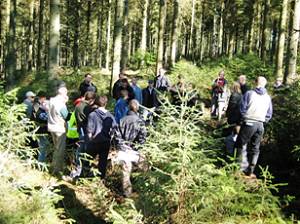Summary
How must organisations change to embed adaptive forest management?
Photo by Ted Wilson
Summary
Adaptive management is widely proposed as a suitable approach for dealing with uncertainty and complexity in natural systems, particularly in relation to climate change. But it is often difficult to implement for social reasons: poor stakeholder communication, lack of transparency in decision-making, and resistance to cultural change. Forest Research reviewed the literature and made in-depth case studies to identify areas for further research to support adaptive forest management in the UK.
Key findings
- Definitions of adaptive management range from ‘learning by doing’ to ‘a highly structured and scientific approach to planning, implementing, monitoring, reviewing, and modifying management in the light of new evidence, in collaboration with relevant stakeholders’
- Adaptive forest management (AFM) is widely known and advocated in North America and other temperate forest regions. It is less widely implemented, but experiences have been well analysed and documented in Canada, Northwest USA, Australia and New Zealand
- AFM relies on innovation and creative thinking about approaches to silviculture, but there is little insight into how to encourage such innovation within an organisation
- AFM is not explicitly adopted in British forestry, but recent innovations such as continuous cover forestry, and new approaches to monitoring woodland grazing, offer promising examples of a more adaptive approach
- The UK exhibits relatively small scale and diverse patterns of land use, high societal expectations and use, relatively high private ownership, and an increasing institutional culture of partnership – conditions which favour AFM through learning coalitions and networks
The study also recommended further research into AFM, focusing on a broad set of questions covering all aspects of AFM practice, implementation and evaluation.
Publications
Funders and partners
Commissioned and funded by the Forestry Commission.
Status
2008-2011
